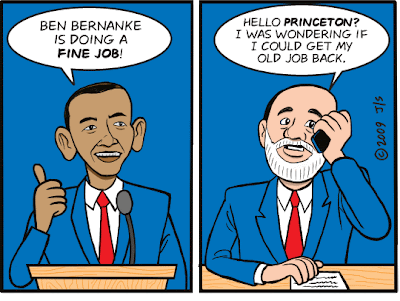The following commentary appeared in the January issue of the Forbes Growth Investor.
By Vahan Janjigian - When I was in graduate school, a marketing professor told me that investing was easy. He said,“All you need to do is buy low and sell high.” However, many investors did exactly the opposite last year. They threw in the towel at precisely the wrong time. As stocks sold off in March and the Dow dipped below 6,600, they decided stocks were too risky, so they got out of the market. They did not understand that stocks are actually
less risky after that kind of selloff. Instead of selling in March, they should have been buying. Even if they had to wait a few years, chances are the returns they would have realized from stocks would have exceeded the returns generated from safer assets such as cash.
As it turns out, however, those who did buy in March did not have to wait long at all. Stocks went straight up after the selloff in the beginning of the year. The Dow finished 2009 with a 19% gain, the S&P 500 rallied 23%, and the Nasdaq Composite surged 44%. Our Forbes Growth Investor Top 40 climbed 35%. While it did not outpace the tech-laden Nasdaq, it did exhibit less volatility. Since inception (Oct. 6, 2000), our stock picks have gained 75%. The three major indexes lost ground during the same period. The Dow fell 2%, the S&P plunged 21%, and the Nasdaq plummeted 32%.
However, the higher stock prices go, the more cautious I become. Investor sentiment may drive stocks higher in the short term, but fundamentals are more important over the long term. As I see it, the fundamentals are not particularly good.
While the worst of the financial crisis is probably over, the economy is still troubled. The unemployment rate may have peaked, but it will probably remain elevated for years. Housing prices may have bottomed, but they will likely remain depressed for quite some time. Retail sales during the holiday season were better than expected, but that trend will probably fade in 2010. Corporations are producing profits not by selling more goods, but by cutting expenses. In addition to all this, capacity utilization is near all-time lows, new home sales are at a standstill, government debt has surged to almost unfathomable levels, consumer credit is falling, and savings rates are rising at precisely the wrong time. A particularly worrisome trend is the growing role government is playing in the economy. It is the nation’s largest employer, it has become the largest shareholder in a number of previously blue-chip companies, and it is about to take over the healthcare system.
Given this backdrop, there are a number of things to watch for in 2010. We may have emerged from the recession, but a double dip is possible. However, a second recession, if it does indeed occur, should be less severe than the first. Gold prices could fall significantly. They have not risen to current levels because of strong demand or a lack of supply. Gold prices have climbed because of the Fed’s easy monetary policy and the resulting weak dollar. Similarly, oil prices should go lower. The recession has reduced demand for gasoline and other refined products. The big push toward alternative energy is also having an impact on the demand for fossil fuels. As for stocks, they could sell off again. A retest of the March 2009 lows is unlikely, but the Dow could easily shed a thousand points or so. If that happens, it will be time to start thinking about buying once again.
.gif)
.gif)
